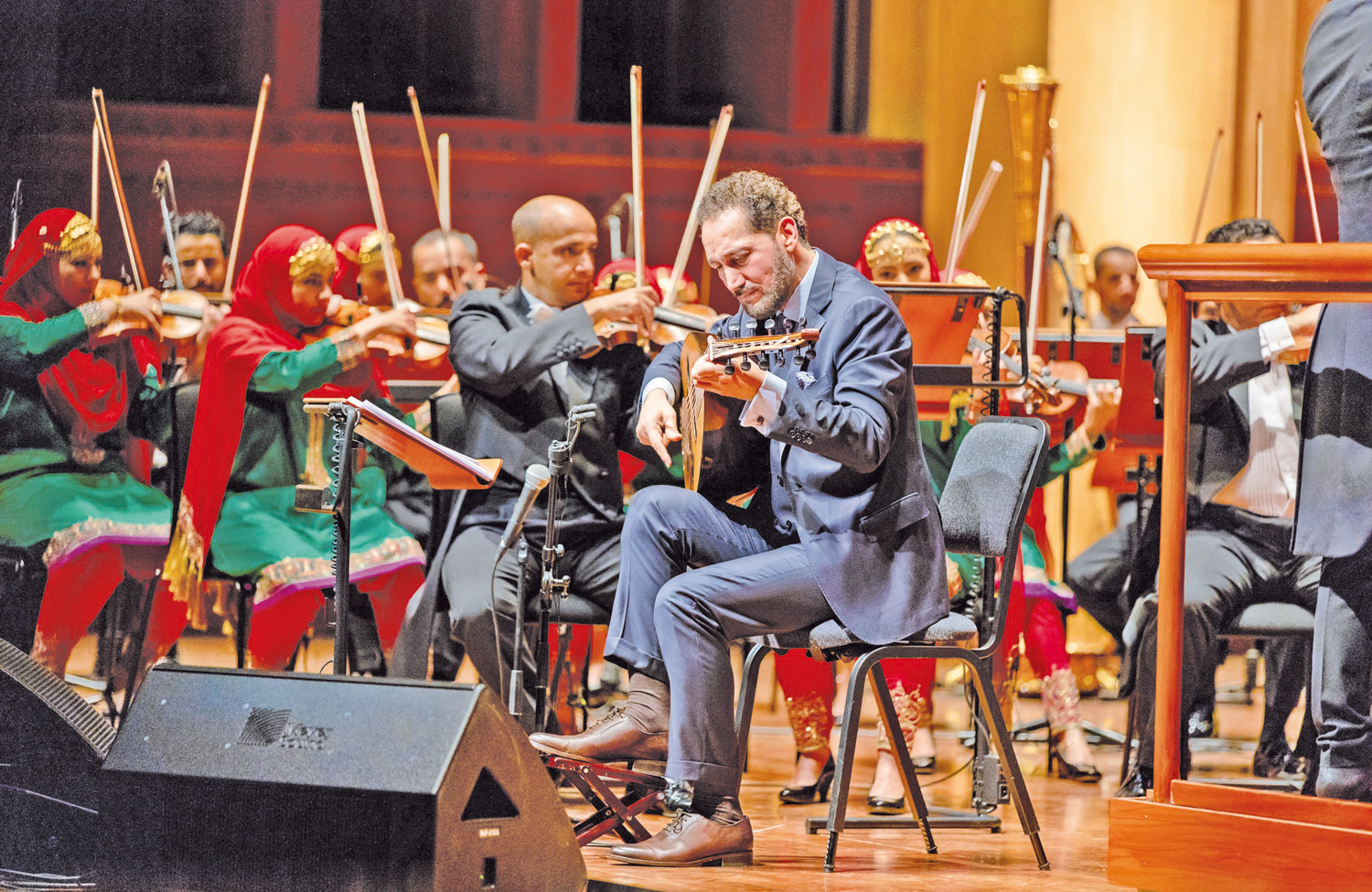

With TV crews poised and a sold-out auditorium, the Royal Oman Symphony Orchestra’s first appearance on the stage at the Royal Opera House Muscat this season was all set to be a winner on Friday evening.
They were to accompany the 55-year-old Iraqi artist, Naseer Shamma, who is lauded for his ‘global reputation as the leading expert in Oud on the international scene’. High stakes to live up to for his 90-minute set at an early evening performance in Muscat.
Some attendees may have been confused by the 7 pm kick-off as the hall was far from full at first as the members of ROSO, the women beautifully dressed in national colours and the men in black dress-suits, filed onto the stage to begin.
If so, it was their loss because the orchestra was in its element on Friday evening, playing confidently and with ease in the familiar Arabesque style. The Lebanese conductor and arranger, Andre El Hajj from the Holy Spirit University of Kaslik, made his second appearance at ROHM this year after his acclaimed appearance in February conducting ROSO with the famous Lebanese singer, Jahida Wehbe.
Naseer Shamma is a personable, approachable musician who took care to introduce each of his nine instrumental compositions to the mixed audience of Arabic and Western listeners.
He is known for his focus on humanitarian commitments and his charitable vision has been internationally recognised. He is an Ambassador for the ‘International Non-Violence Association’ and this has coloured much of his compositional inspiration over the years.
“‘Alaq Baghdad’ is an ongoing project to rebuild 21 of the central areas in Baghdad, and rehabilitate the main high streets in an effort to bring back investment to Iraq”.
Naseer Shamma opened the concert with a long Oud solo-introduction to ‘Hearing Farah Feza’, arranged by Samar Abu Raslan in a folky vein. It led to ROSO’s jazzy entrance in an almost Spanish style, with rhythmic pizzicato from the strings, followed by another virtuoso solo from the maestro. Shamma’s musical language is extremely accessible to Western ears and posed no cultural barriers.
‘From Memory’ was contrasting in mood, arranged by El Hajj using lush, chromatic harmonies with fine harp playing from Badar bin Yahya al Busafi and some strong moments from the Brass. “Good Morning Baghdad” opened with a beautiful, slow harp solo in a sad, melancholic mood, only emphasised by the mournful tremolos on Oud. It led to a faster, percussive tutti using the woodwind at their best and guest ‘Oriental Musicians’.

Latecomers trapesed in as ‘Tomorrow is More Beautiful’ played using a noticeably Arabic scale, opening as most numbers did, with an Oud solo, dedicated to Palestinian people. In the middle, there was an evocative, improvised accordion solo by Farouq Hassan based on a plaintive folk-melody, which gained spontaneous response from the audience. More late arrivals slid into their seats filling the hall.
‘At The Edge of Pain’ opened with dark, sustained chords from the Brass, and featured a stirring Qanoon solo midway, from Amir bin Awadh Bait Mabrouk. Contrasted by brassy rhythmic sections, the ROSO trumpets (Hussain al Ajmi and Marwa al Shandoodya) brought the orchestra to its dynamic heights. A driving rhythm suggested a train journey, with Nay obligato, M Kawalah, evoking the train whistle — or maybe the pain of the author.
‘Sadiq Jalal Alozam’, arranged by Waleed Abu Sarhal, was very similar in mood to the second piece. It opened with a highly melodic Oud solo over the longbows of string accompaniment in a lush, romantic style. Leader of ROSO had a moving solo before the piece ended abruptly with punctuated brass chords.
In several sections, the popular and brilliantly effective ‘Sunrise’ began with a slow Nay solo over a sustained bass line from the ‘Cellos and Basses’. It burst with exciting, syncopated pizzicato strings against a dialogue between Oud and Qanoon, followed by a strong, rhythmic tutti featuring traditional percussionist brothers, Salim and Tariq al Yaqoobi. A stunning, fast virtuoso solo for Naseer was followed by the strings in a classically Arabic conclusion.
The penultimate number, ‘White’, was like a film score, perhaps reflecting his countless works for theatre and television, with solo interludes from Accordion, Qanoon, Oud and Violin, building up to a huge climax for whole orchestra featuring brass, timpani and cymbal explosions.
Equally filmic but for darker reasons was the well known ‘Alameria’, a grand finale in tribute to the catastrophic missile dropped on a shelter in Alameria, Iraq. From a sorrowful Nay solo, the piece built up in almost operatic proportions using string and Oud tremolos, to a menacing death-march climax with an Arabic scale, to commemorate those Iraqis who died so needlessly at the hands of violent invaders. There was no encore and no curtain call. Lights went up and the audience left feeling this had been a truly exciting, uplifting performance, and a ‘journey for the soul’.
GEORGINA BENISON
Oman Observer is now on the WhatsApp channel. Click here



